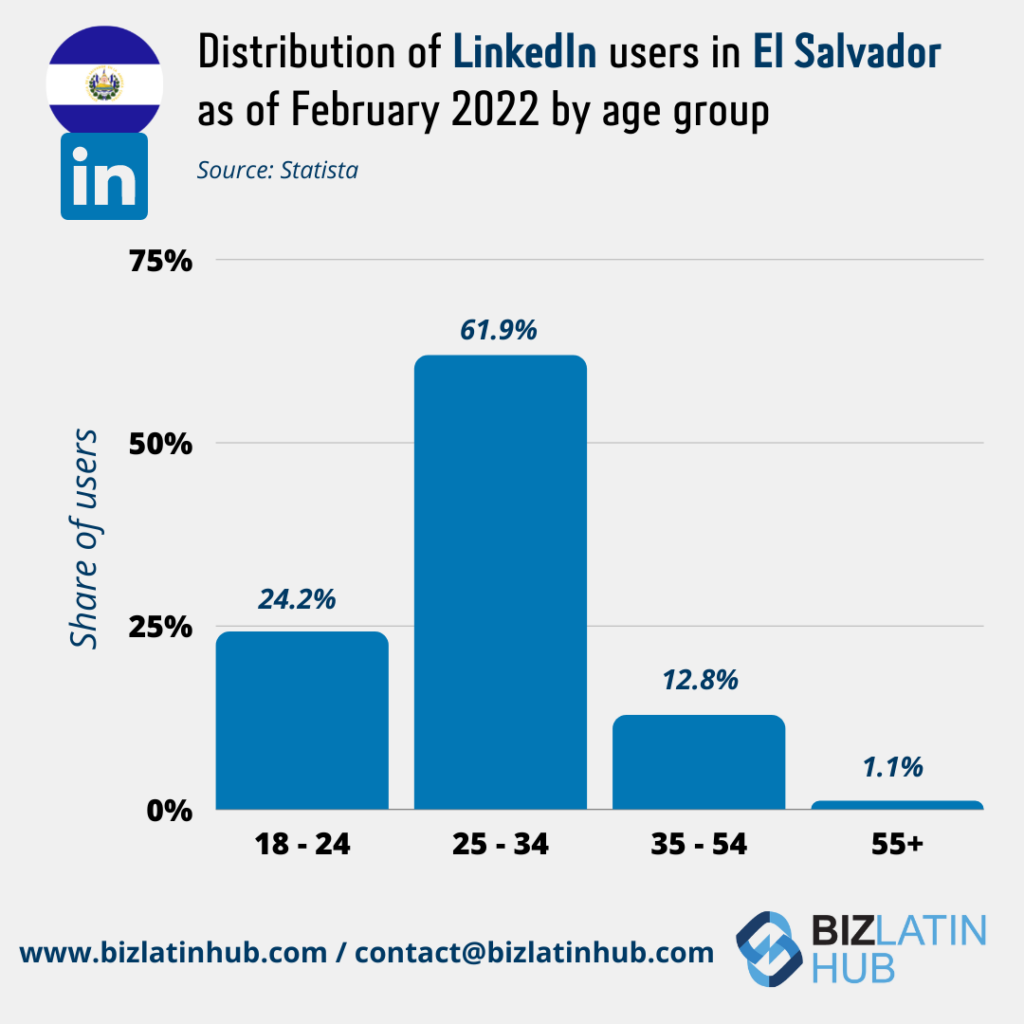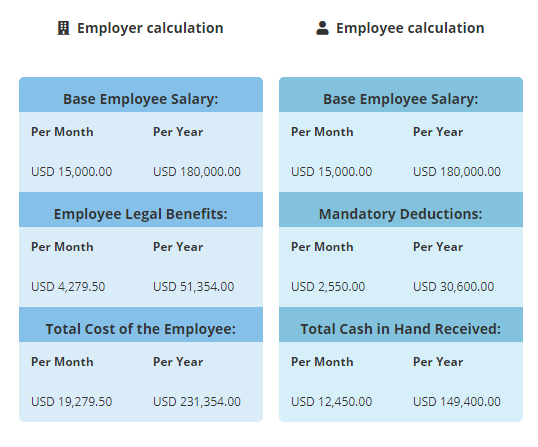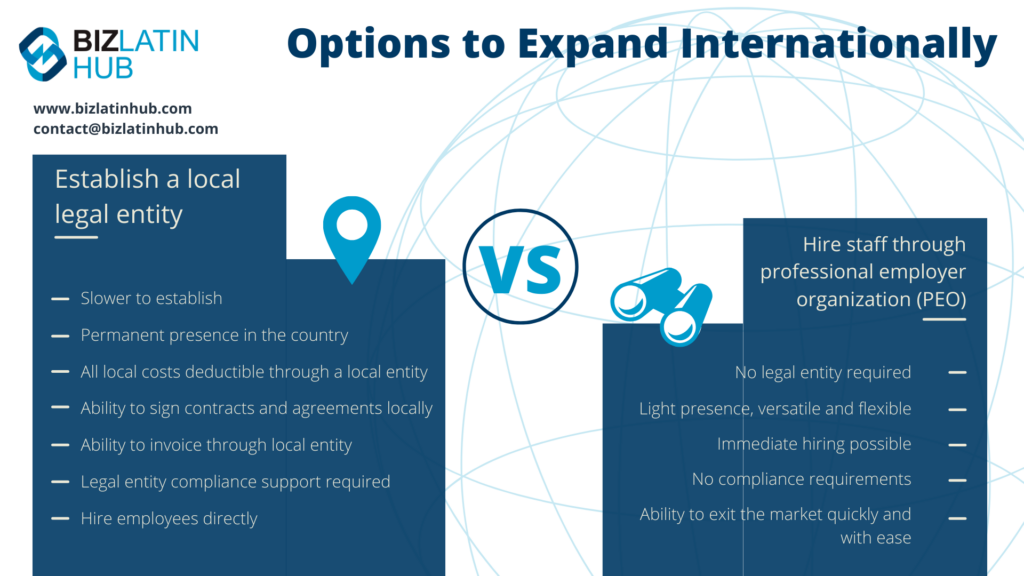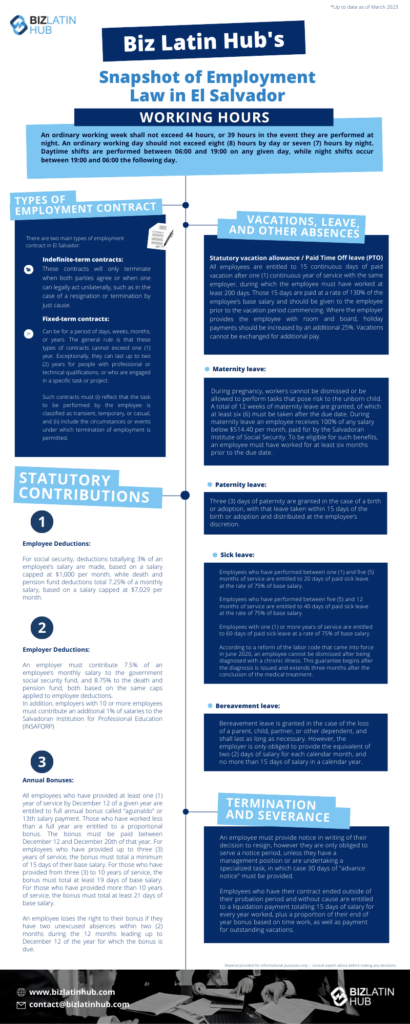El Salvador presents many compelling reasons for engaging in business. For those looking to move operations to the region, a Professional Employer Organization in El Salvador (PEO firm) can help your business achieve compliance and help streamline operations. This article will outline why a PEO/EOR firm in El Salvador can be strategic and helpful for your company.
Several of the most popular reasons for investing in El Salvador are listed below;

- Growing Economy: El Salvador’s economy has shown resilience and growth. In 2022, the country’s GDP grew by 2.6%. A Professional Employer Organization in El Salvador can help your company mitigate risks and complications in regions that may fluctuate economically.
- Investment-Friendly Environment: El Salvador has implemented measures to attract foreign investment. It has established the “Proesa” agency, which focuses on promoting exports and attracting investment to the country. El Salvador ranked 96th out of 190 countries in the World Bank’s Ease of Doing Business Index 2020, showcasing improvements in the business environment (source: World Bank).
- Skilled Workforce: El Salvador has a young and talented workforce. The country has invested in education and vocational training programs to develop skilled professionals. El Salvador is known for its expertise in industries such as information technology and services, manufacturing, and textiles. A quality Professional Employer Organization in El Salvador can help your business tap into the highly-skilled talent pool the region has to offer.
- Strategic Location: El Salvador’s geographical location offers advantages for businesses. It is situated in Central America, providing access to regional markets and being part of the CAFTA-DR free trade agreement with the United States, offering preferential access to the largest consumer market in the world.
- Digital Transformation: El Salvador has been actively promoting digital transformation initiatives. The country has a strong focus on technology and innovation, with government programs supporting startups and technology-driven businesses. El Salvador is becoming a hub for fintech and digital entrepreneurship. A Professional Employer Organization in El Salvador will be able to keep your company updated with changes in the technology sector.
- Renewable Energy Potential: El Salvador has embraced renewable energy sources. The country has significant geothermal, solar, and wind energy potential. It aims to generate 100% of its energy from renewable sources by 2025, attracting investments in the renewable energy sector
These factors, supported by reliable sources, demonstrate why El Salvador offers opportunities for business growth, investment, skilled workforce, strategic location, digital transformation, and renewable energy.
Considering the range of attractive commercial opportunities available in the region, many willing investors are looking to expand their commercial operations to El Salvador. However, before setting up a local company in El Salvador or a branch office, many companies like to ‘test’ the local market. A local Professional Employer Organization in El Salvador (PEO) solution is a great way to do this.
Table of Contents
What is a Professional Employer Organization (PEO/EOR) / Employer of Record in El Salvador?
A Professional Employer Organization in El Salvador (PEO), otherwise known as an ‘Employer of Record’ is an organization that provides and supports companies with their HR functions – from the very first stages of recruitment to the payments of taxes and benefits.
PEOs undertake the fundamental but time-consuming HR tasks, allowing companies to focus their attention on the growth and success of their business.
The services of a Professional employer Organization in El Salvador are particularly useful when companies are seeking to hire a local workforce but either do not want to or aren’t able to set up a local legal entity.

Benefits of Using a PEO/EOR in El Salvador
A Professional Employer Organization in El Salvador will enable your company to maintain your focus on your business’ development while the HR burdens are outsourced to the PEO/EOR.
- Cost-effective – Reduces recruitment and administrative expenses and saves you money if you want to hire local staff but do not have a fully incorporated company.
- Recruitment – Assists you in finding the most suitable and qualified staff for your company.
- Limited Liability – Limits your level of liability with respect to tax and labor obligations.
- Time-effective – Removes the need for you undertaking the time-consuming but fundamental tasks of processing payrolls, payment of employee benefits and other HR administration.
- Local expertise – A Professional Employer Organization in El Salvador will ensure that you are in compliance with all El Salvadorian employment laws and regulations, due to their expertise of local laws and regulations.
Foreign nationals who have the intention of registering a business in El Salvador must first take into account the fundamental employment laws and regulations. Companies must ensure 100% compliance with the legal requirements before entering into an employment relationship in El Salvador. This is made easier with the help of a quality Professional Employer Organization in El Salvador.
How to Use a Professional Employer Organization in El Salvador to Hire Staff
All companies thinking about hiring staff in El Salvador must take into account compliance with regard to the following labor obligations:
Each legal requirement mentioned below can be completed by a Professional Employer Organization in El Salvador.
- Work contracts – It is the obligation of every employer that every employee must formalize with them an employment contract, which can be for an indefinite or fixed term.
- Foreign employees –The hiring of foreign personnel in El Salvador is allowed, however, this type of contract has its limitations; within the company, foreign employment cannot exceed 10% and that of the total salaries paid to foreigners cannot exceed 15%. These rules do not apply if the foreign person holds the positions of Director, Administrator or Manager. The person’s position must be registered in the Commercial Registry and may have up to 4 foreign employees under this type of position.
- Social Security – All the employees that you have under your payroll must be registered in the Salvadoran Social Security Institute (ISSS).
- Pension Fund – This applies the same as the ISSS; all employees under payroll must be registered with a Pension Fund Association (AFP).
The labor regulations through the region can be complicated to navigate without the help of a Professional Employer Organization in El Salvador. They will be able to ensure your company is compliant and operating within the legal framework in the country.
How to use a payroll calculator
If you are keen to get an idea of the possible costs involved in payroll outsourcing in El Salvador, using a payroll calculator is one way to get a very good estimate.

Because while a payroll calculator won’t be completely accurate, it will give you the opportunity to search according to the salary, the number of employees, the country you want to enter, and the currency you wish to work in. As such, you will be able to understand your likely costs across a range of salaries, while also being able to compare other countries as potential alternative destinations.
You can find the BLH payroll calculator at the bottom of our Hiring & PEO Services page. The calculator will allow you to make good estimations of the costs involved in hiring in Latin America and the Caribbean based on country, currency, and salary, with the calculator factoring in local statutory deductions.
To use the BLH payroll calculator, you will need to undertake the following steps:
Step 1: Select the country
Choose the country where you are doing business, or planning to launch. This feature will be useful when it comes to comparing potential alternative markets.
Step 2: Select the currency you wish to deal in
You can choose between US dollars (USD), British Sterling (GBP) and Euros, as well as the local currency for the country you are looking at, based on that which is most convenient to you. Note that for Ecuador, El Salvador, and Panama, the local currency is also USD, as they have dollarized economies.
Step 3: Indicate an employees monthly income
Here you can indicate the expected salary you will be paying an employee, in the currency of your choice.
Step 4: Calculate your estimated costs
Based on all of the information you have provided, you will receive results indicating your estimated costs, including a breakdown for estimated statutory benefits you will be liable for.
Step 5: Compare your costs to other options
With a good estimate at hand of how much your staff in El Salvador would be, if you are flexible about your expansion into Latin America and the Caribbean, you can use the BLH payroll calculator to compare those costs to other jurisdictions.
Common FAQs when hiring through an Employer of Record (EOR) in El Salvador
Based on our experience these are the common questions and doubts of our clients.
You can hire an employee by incorporating your own legal entity in El Salvador, and then using your own entity to hire employees or you can hire through an Employer of Record (EOR), which is a third party organization that allows you to hire employees in El Salvador by acting as the legal employer. Meaning you do not need a Salvadoran legal entity to hire local employees.
A standard Salvadoran employment contract should be written in the Spanish (and can also be in English) and contain the following information:
-Name, ID, Tax ID, social benefits numbers of the employee, address of the employer and employee
-City and Date
-Job Title
-Work Hours
-Location where the service will be provided
-Salary and payment frequency
-Social benefits
-Probation period (Has a maximum of 30 days)
-Specific agreements with the employer
The mandatory employment benefits in El Salvador are the following:
-Social Security and Pensions contributions
-Vacation
-Aguinaldo (13th Month Bonus)
-Severance Pay* Only applies if the employee’s contract is terminated without just cause.
For more information on mandatory employment benefits read our recent article on Employment laws in El Salvador.
The total cost for an employer to hire an employee in El Salvador can vary depending on the salary; however, as a rough estimate, the employer’s cost for mandatory employment benefits typically ranges from 25% to 35% of the gross employee salary. This is in addition to the employee’s gross salary.
Please use our Payroll Calculator to calculate employment costs.

Rights and Benefits of Workers in El Salvador
Below we explain more about the benefits and rights of workers in El Salvador.
In El Salvador, labor laws are more aligned with the protection of the rights and benefits of workers rather than employers. It’s important to take into account what these additional benefits are. A quality Professional Employer Organization in El Salvador will be able to handle these responsibilities in a compliant matter:
- Bonus – A premium paid to workers at the end of the year between December 12 and 20, depending on the amount of time the worker has for the same employer must be paid as follows:
a) From 1 to 3 years: an employee must be remunerated for 15 days of their standard salary.
b) From 3 to 10 years: an employee should be remunerated for 19 days of their standard salary.
c) 10 or more years: An employee should be remunerated for 21 days of their standard salary. - Minimum salary – the National Minimum Wage Council is the institution responsible for establishing the minimum wage of each sector of economic activity, and each year updates the corresponding values. Currently, the minimum salary for trade and services is USD$302.00 monthly. Because the minimum salary fluctuates, it is important to hire a Professional Employer Organization in El Salvador. They will be able to ensure your company is up-to-date with payroll expectations and remain compliant.
- Overtime – The labor laws of El Salvador establish that the maximum number of ordinary working hours that can be performed is 44 hours weekly. Any time that exceeds this period must be remunerated with a 100% surcharge on the employee’s base salary.
- Vacation period – Every employee has the right to enjoy vacations annually, the number of days they can enjoy is 15 days, and vacations must be paid with 30% of the base salary.
- Sick leave – Employers must pay 75% of the worker’s basic salary for the duration of the illness, not exceeding 60 days a year.
- Maternity or paternity leave – Maternity leave consists of 16 weeks, 10 of which must be taken after birth. Paternity leave consists of 3 days counted from birth.
Do you need to hire staff in El Salvador?
El Salvador is a nation full of potential, simply awaiting the investment of those aware of all it has to offer. The opportunities, especially in services, are more than plentiful for those who are willing to take them. If you want to hire local employees, but do not have an incorporated local entity and want to avoid the administrative burden of establishing and maintaining a local company, then a Professional Employer Organization in El Salvador may be the perfect solution.
Contact our bilingual Team on Biz Latin Hub El Salvador to learn more about how we can support you throughout the hiring and recruitment process.

The information provided here within should not be construed as formal guidance or advice. Please consult a professional for your specific situation. Information provided is for informative purposes only and may not capture all pertinent laws, standards, and best practices. The regulatory landscape is continually evolving; information mentioned may be outdated and/or could undergo changes. The interpretations presented are not official. Some sections are based on the interpretations or views of relevant authorities, but we cannot ensure that these perspectives will be supported in all professional settings.